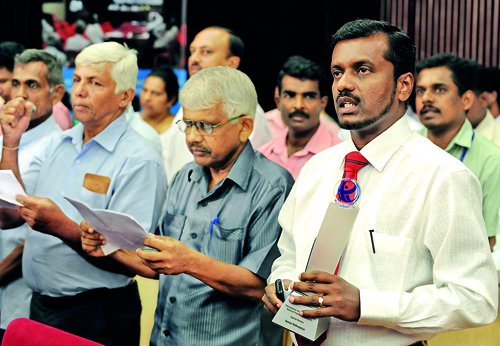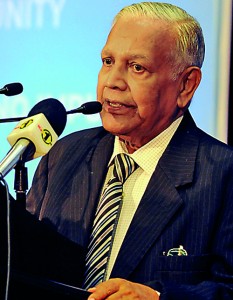Lankan citizens must fight against corruption
View(s):Monday, December 9, 2013 – UN Anti-Corruption Day and Sri Lanka joins the world in celebrating this event aimed at ending the scourge of corruption all over.
Many events including traditional protests and indoor meetings have been organised to mark this annual feature. While at least three meetings are held at the BMICH, a small, elderly man helped by a walking stick expresses perhaps the most powerful message against corruption, without any fear or favour.

Merit winners: Sarath Nandalal of the Rakshana Sewaka Sangamaya (RSS) (representing the union that won) (second from right) and Saman Ratnapriya (right). Below: Justice C.G. Weeramantry.Pix by Amila Gamage.
Within the portals of Committee Room B, his voice is calm but commands respect. There is absolute silence; the audience listens, some using earphones to hear translated versions of his eloquent English speech into Sinhala and Tamil. Every time, Justice and Prof. C.G Weeramantry, former vice president of the international court of justice and a former Sri Lankan Supreme Court judge, speaks he has a message for society, be it good behaviour, equal rights, decent and exemplary conduct for human rights.
On Wednesday, speaking at the annual National Integrity Awards of Transparency International, Sri Lanka, Prof. Weeramantry’s message was essentially a call to stir the conscience of the public towards good behaviour, integrity and honesty.
His other message was that the four great religions that prevail in Sri Lanka – Buddhism, Hinduism, Christianity and Islam – are all linked to international law and the rule of law, and that religion plays a key role in ridding society of corruption.Explaining, what he calls a little-known fact, Prof. Weeramantry says that the current international law practice takes into account Islamic principles that a promise is sacred and cannot be broken.
While the hall was filled with many corruption-busters, civil society activists, human rights campaigners and a few who may have realised – after listening to another magnum opus by one of Sri Lanka’s most eminent personalities – that they were not doing enough as ordinary civilians to oppose corruption, the judges couldn’t find a winner this year for the National Integrity Award. Only two winners in the special mention category were announced: Saman Ratnapriya, a trade unionist who transformed the trade union movement in the health sector, and a union that fought against the corrupt privatisation of Sri Lanka Insurance Corporation, taking it to courts and winning the battle.
Prof. Weeramantry says people are duty-bound to be honest and should not be saying one thing and doing another. “No one should be allowed to hide under a blanket of secrecy.”
 Discussing historical events as easy as explaining the virtues of religion, all to explain the connection to corruption and corrupt practices, the learned Prof. said religions teach the basic principles of human conduct.
Discussing historical events as easy as explaining the virtues of religion, all to explain the connection to corruption and corrupt practices, the learned Prof. said religions teach the basic principles of human conduct.
“Whatever you do, do it honestly . in a principled way. Buddhism teaches us that. Islam tells us to follow the principles that God has taught and that promises are sacred and cannot be broken. Hinduism is guided by righteous conduct while Christ said no one must take cover behind the letter of the law while not applying the spirit of the law,” he said.
“Any act of corruption must be exposed (fully). Secrecy should be fought on every front,” he asserted, adding that there is a great deal of secrecy in the commercial, military and political sectors that poses a danger to humanity.
Norwegian ambassador Grete Lochen, who was the guest of honour, said corruption deters the efficient use of resources.
She referred to the recent annual Global Corruption Perception Index (CPI) just released by Transparency International (TI) where Sri Lanka has been placed in the 91st position among 177 countries worldwide, sliding by 12 places from last year’s position of 79.
Given these indicators, she said there is a need to keep public institutions in check.
She referred to the right to information laws in Norway and said Sri Lanka too should enact its own laws to provide full disclosure to the public.
Under Norwegian laws, taxes are very high and all tax payers must show their assets and wealth annually to the public.
“Transparency International here is doing a great job. Covering and reporting on financial mismanagement is not easy. As a watchdog, you must also (be coming) under attack yourself,” she said.
(Feizal)



